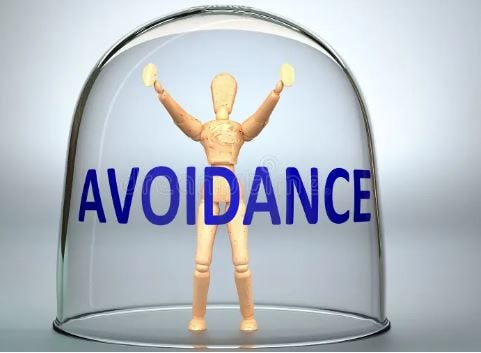Things I Learned Growing Up That Maybe I Wish I Hadn't
That there are Only Two Ways to Answer Any Question: "Yes" and Avoidance
When we play board games here at the house, we have a certain subset of our family population that struggles greatly with making decisions. It quickly changes a 30 minute game into a couple of hours if they all play with us. There have been times, in that situation, that Isaac and I will start playing another game on the side just to pass the time between turns.
Sadly, as a society we are plagued with this same sort of indecisiveness. It is not a halting between a “yes” or a “no”, but rather between a “yes” and complete avoidance of the decision altogether. I think we have become convinced that any evidence of discernment will be starkly rejected by the masses, so it is then best for us to either agree and go along with them, or we avoid it until we can go to our own little social media page and air our opinions and thoughts there.
Is that a Godly approach?
Matthew 5:33-37 “Again, ye have heard that it hath been said by them of old time, Thou shalt not forswear [to swear falsely] thyself, but shalt perform unto the Lord thine oaths: But I say unto you, Swear not at all; neither by heaven; for it is God's throne: Nor by the earth; for it is his footstool: neither by Jerusalem; for it is the city of the great King. Neither shalt thou swear by thy head, because thou canst not make one hair white or black. But let your communication be, Yea, yea; Nay, nay: for whatsoever is more than these cometh of evil.”
We are to be WITHOUT wavering, beloved! As a preface, “I don’t know” is not wavering— it is an appropriate answer to a question or scenario in which you find yourself to be unprepared to go any further. Contrastly, “Maybe” is wavering and should be avoided. What is better than leaving an open-ended situation is a little word that just so happens to be the same in most languages— “no”. In the Scripture above, that is the very word that “Nay” references.
Imagine just a day in your life in which you answered every situation with a definitive “yes” or “no”. It is freeing is it not?
Did Jesus waver?
Luke 13:1-5 “There were present at that season some that told him of the Galilaeans, whose blood Pilate had mingled with their sacrifices. And Jesus answering said unto them, Suppose ye that these Galilaeans were sinners above all the Galilaeans, because they suffered such things?
I tell you, Nay: but, except ye repent, ye shall all likewise perish.
Or those eighteen, upon whom the tower in Siloam fell, and slew them, think ye that they were sinners above all men that dwelt in Jerusalem?
I tell you, Nay: but, except ye repent, ye shall all likewise perish.”
In both of these situations, the Lord Jesus did not hesitate nor did He pander to the feelings of those asking the questions. He simply said “no” and stated a relating fact to go with it. If you asked me if I liked Spaghetti with meatballs, I would likely respond with, “No, because I tend to make a mess of myself with that particular noodle.” If I were to respond in a wavering manner, may sound more like, “Not really— ‘with meatballs’ is certainly better than without, but do you have Penne?” I have not only kept you longer than you intended to stay (which is a trait of sin by the way), but now I have started a new conversation instead of closing the first one for you.
It has been my observation that most difficult situations are answered with avoidance. We stick our heads in the sand in hopes that the threat of having to appear as an individual in society with our own thoughts will not find us. I am reminded of my brother when we were kids. When he would get frustrated with me, he would close his eyes and start yelling, “you can’t see me, you can’t see me”. Could I still see him? Yes. I could. As silly as the image of this scene is in your head, we are equally ridiculous when we pretend that avoidance is actually an answer.
Sadly, with Christians, this is never more dire than when it comes to our need to share the gospel. 2 Corinthians 4:1-4 “Therefore seeing we have this ministry, as we have received mercy, we faint not; But have renounced the hidden things of dishonesty, not walking in craftiness, nor handling the word of God deceitfully; but by manifestation of the truth commending ourselves to every man's conscience in the sight of God. But if our gospel be hid, it is hid to them that are lost: In whom the god of this world hath blinded the minds of them which believe not, lest the light of the glorious gospel of Christ, who is the image of God, should shine unto them.”
Born-again believers, we most definitely do have this ministry, and it was given to us by the Son of God. “Faint not!” “Renounce the hidden things of dishonesty…”— which includes wavering. Do not handle the Word of God deceitfully; it is not okay for all of our answers concerning Scripture to be “I don’t know”. Yes, I know what I said earlier in this article, and I’ll quote it again here for reference:
“‘I don’t know’ is not wavering, it is an appropriate answer to a question or scenario in which you find yourself to be unprepared to go any further.”
I have NOT contradicted myself, for why would it be okay for us as Christians to find ourselves “unprepared to go any further”? 2 Timothy 2:15 “Study to shew thyself approved unto God, a workman that needeth not to be ashamed, rightly dividing the word of truth.” This is not instruction that was exclusive to Timothy, nor is it exclusive to only pastors/deacons. If it is in your KJV Bible, then it is for YOU too!
Why are we so afraid to know our Bible? Would you rather go around the work of reading it than actually go through it to have an answer ready next time a question is asked? We quoted this a few articles back, but it applies here again. Consider the Bereans: Acts 17:10-12 “And the brethren immediately sent away Paul and Silas by night unto Berea: who coming thither went into the synagogue of the Jews. -- These were more noble than those in Thessalonica, in that they received the word with all readiness of mind, and searched the scriptures daily, whether those things were so. Therefore many of them believed; also of honourable women which were Greeks, and of men, not a few.” Dr. Luke was not shaming other believers with this comparison, rather he was admonishing the reader to be like them!
“…let your communication be, Yea, yea; Nay, nay: for whatsoever is more than these cometh of evil.”
We may need to put in some work to answer this call to action, beloved, but it is a worthwhile effort. Simon Peter says there is happiness in it:
1 Peter 3:13-17 “And who is he that will harm you, if ye be followers of that which is good? But and if ye suffer for righteousness' sake, happy are ye: and be not afraid of their terror, neither be troubled; But sanctify the Lord God in your hearts: and be ready always to give an answer to every man that asketh you a reason of the hope that is in you with meekness and fear: Having a good conscience; that, whereas they speak evil of you, as of evildoers, they may be ashamed that falsely accuse your good conversation in Christ. For it is better, if the will of God be so, that ye suffer for well doing, than for evil doing.”
May the Lord be merciful unto us and increase our faith that we might walk more earnestly after Him!






